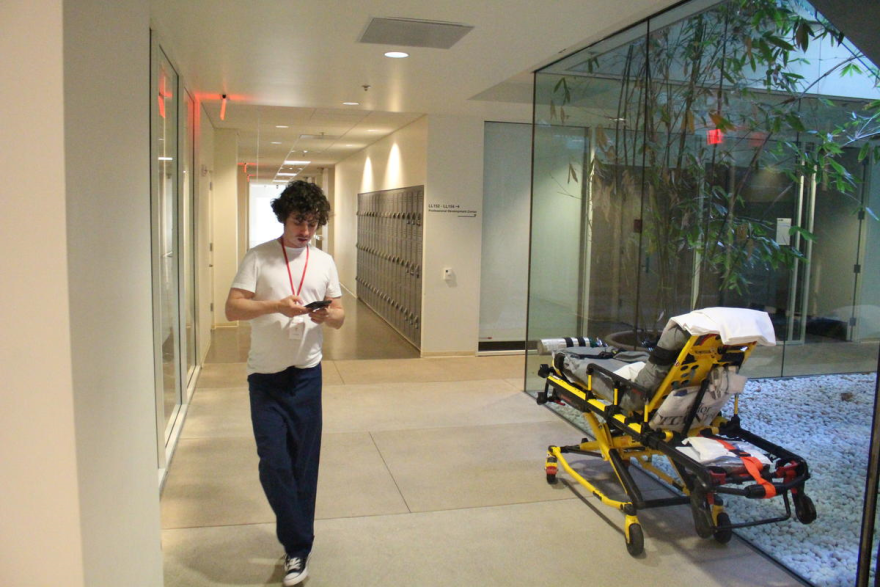Jeff Tully has been practicing medicine for six years. The 32-year-old is healthy and has no underlying medical issues, but he is still concerned about COVID-19.
As an anesthesiologist in the intensive care unit, Tully says it's only a matter of time before he and his colleagues are exposed to the virus.
“We're doing intubations and a lot of procedures on critically ill people,” he said. “That's about the highest risk to getting exposed is when you're performing a procedure like that, that causes aerosolization of the viral particles.”
Tully works at the University of California Davis medical center in Sacramento. In February it became the first hospital in the country to treat a community-spread case.
“I think it’s going to become more and more real,” he said. “We have a couple of positive tests from employees at my current facility.”
Tully says while he and his young colleagues know the odds are low they would fall seriously ill, the anecdotes about young healthy people dying are becoming more common.
Hi, I’m an anesthesia resident intubating sick patients on the front lines of #COVID19. Any lawyers out there willing to help healthcare workers like me with a living will or medical power of attorney document? Thanks very much. #lawtwitter
— Jeff Tully (@jefftullymd) March 25, 2020
Last week, he reached out on Twitter to find assistance in setting up a living will, joining a growing number of doctors documenting their wishes for end of life care, in the face of this pandemic.
My sister and most of her friends are doctors. The crisis is expected to peak in Texas shortly. Tomorrow they are all writing up their living wills. Why is there not enough protective equipment? I’m honestly struggling to get caught up on this and clearly understand why. https://t.co/gQlnU2wmN6
— lomikriel (@lomikriel) March 29, 2020
“If things look like they're going south, and if other people need the resources, I don't want to be the type of person that there has a lot done to no avail at the very end,” said Tully.
Shortages in personal protective equipment — along with the massive gap between the number of ventilators in the country and the projections of people who will need them — have made the potential for healthcare rationing a reality as well.
Dr. Jason Morrow is a palliative care specialist and a professor of medical ethics in San Antonio, and says the pandemic has made a reality out of these formerly abstract ideas.
“Doctors are having to wrestle with two very real types of harm: It’s not just the physical harm of getting sick it's the feeling that I don’t get to practice medicine as usual and that I am at risk of abandoning my patient,” he said.
Italian doctors reportedly were weeping in hospital corridors over these choices…choices that may be commonplace on the battlefield or in low-resourced countries, but not here in the U.S.
Many hospitals in hard-hit areas have drawn up guidelines for rationing care, a topic that Morrow said makes many doctors uncomfortable. Even here in San Antonio — which hasn’t seen a surge yet.
“Let’s dwell on that for a moment. Let’s sit up in that chair, let’s think about what should be our guiding principle,” said Morrow in a recent conference call examining medical rationing.
UT-Health’s Center for Medical Humanities and Ethics hosted about 50 area doctors on a conference call to examine a recent New England Journal of Medicine article on the subject.
“I think people are taking these questions seriously. I also think they get uncomfortable and feel inadequate when push comes to shove,” he said.
Debating these issues now could help doctors make a call they can live with later.
The context of the current pandemic has changed much of the conversation around end-of-life planning and rationing he said. Because patients are scared and, to a certain extent, doctors have skin in the game too.
“It’s always been the patient who has the cancer, who has the kidney failure, who has HIV and the doctor is insulated from that,” Morrow said. “Now we're all in the same boat.”
For Tully, who is finishing up his own advanced directive for care, it isn’t about fear it’s about not putting it off any further.
“I think doctors are the worst patients and doctors very rarely follow their own advice,” he said
Something, he said, none of us can really afford to do anymore.
Paul Flahive can be reached at paul@tpr.org or on twitter @paulflahive.


